#christian history
Explore tagged Tumblr posts
Text
So at the most extreme, possibly mob violence, according to Acts:
"Then they dragged [Stephen] out of the city and began to stone him; and the witnesses laid their coats at the feet of a young man named Saul. While they were stoning Stephen, he prayed, 'Lord Jesus, receive my spirit.' Then he knelt down and cried out in a loud voice, 'Lord, do not hold this sin against them.' When he had said this, he died.
And Saul approved of their killing him." (Acts 7:58-8:1)
I don't believe that there's another recorded instance where Paul participated in stoning or anything but it's reasonable to feel afterwards like one should have done something rather than watch a man be stoned to death.
The other instance of active persecution we have is Acts 9:4:
"Meanwhile Saul, still breathing threats and murder against the disciples of the Lord, went to the high priest and asked him for letters to the synagogues at Damascus, so that if he found any who belonged to the Way, men or women, he might bring them bound to Jerusalem."
From this it seems that Paul was working with the priests to persecute Christians. (Although the term Christian here is an anachronism; Paul's conversion takes place between approximately 31-36 BCE, so this is extremely early. He's not persecuting Christians, he's trying to rein in people he sees as apostate Jews. You can see in Acts that this is the period where the faith was referred to as "the Way.") If it's temple authorities, presumably they let him do it for the same reason that they wanted to remove Jesus.
In Companion to the New Testament: The Gospels and Acts, Matthew L. Skinner writes that Paul is doing this on behalf of the priests and notes that the stoning of Stephen is really the start of the persecution and the point at which "followers of the Way" begin to flee Jerusalem.
To understand "persecution" here, we can also look at the Greek verb: διώκω (dióko). Step Bible says that this means "to pursue, to persecute, to systematically oppress and harass a person or group" (a long with some extended meanings). It's used in Matthew 5:11 in the Beatitudes:
Blessed are you when people insult you, persecute you and falsely say all kinds of evil against you because of me.
This suggests to me that persecute probably has connotations of polemic. Roman persecution included coliseum executions, but straight up murder seems a little incongruous with "insult and slander." So we're likely talking about a different kind of persecution, and it's possible that this has the precise meaning of "pursue," as indicated by him wanting to round up followers of the Way on his way to Damascus. Supporting this, διώκω is also the word used in John 5:6 for "the Jewish leaders began to persecute him." I think that in John it certainly means to pursue him (for legal action).
So we have two possibilities:
1) Paul persecuted followers of the Way extralegally, by condoning mob violence and speaking against them.
2) Paul pursued legal action against followers of the Way.
Or possibly both. What's really fun to me about Acts 9:4 is that there's actually no indication that the priests asked PAUL to bring people bound to Jerusalem. Maybe it's just something Paul really wanted to do. Who knows. He does seem to have obtained the letters but it's unknowable what the authorities would have done because he has his life-altering vision of Jesus on the way to Damascus right after this.
One (of many) interesting thing about Paul is that he was persecuting Christians as a Jew (rather than as a Roman citizen) in the mid-First Century when, as far as we can tell, there really wasn't that much persecution of Christians by anyone going on.
Like, I'm inclined to believe Paul when he said he was a persecutor, but I'm really curious about the specific context that enabled it.
#book of acts#paul the apostle#christian history#discourse#not a recommendation for Skinner's book. it's my only acts commentary because it was assigned for class this summer#and i haven't even opened it except to see if he had anything useful for this lmao
44 notes
·
View notes
Text
I'm OBSESSED with the Council of Nicaea. It's spring of 325. Christianity has been legal for 12 years. Constantine wants a unified religion for the Empire but the church has already schismed three different ways in the 3 centuries since the death of Christ, and legalization ITSELF causes a schism. They don't even all agree that being a legal religion is good. Now they're schisming about the nature of Christ. He can't persecute them into agreeing and Lord knows he's tried.
So Constantine calls all the bishops to his fucking summer resort, on the imperial dime. 280-318 bishops are going to argue about if the Logos (Christ) was "eternally begotten" or the first creation of God. Santa Claus is going to punch Arius in the face for saying the Logos was created. While we're here, let's set a date for Easter, which we also never pinned down. And we have to decide if eunuchs can be ordained because EVERYTHING HAS ALWAYS BEEN THIS WAY.
I've been to church conferences. I lose it every time I think about this. Bishops coming into Nicaea tired from the road (travel's a curse). Rural bishops coming to the seat of power for the first time. There's one guy who doesn't understand Robert's Rules and another guy who won't stop bringing up points of order. Someone's sleeping through all the speeches; he's just happy to be on vacation at the emperor's summer resort. The decision made here will form the closest thing Christianity has to a universal declaration of faith for the next 1700 years and it's going to take THREE MONTHS and we have to do it again in 6 years
I'm fancasting my Nicaea movie as we speak
#christianity#christian history#council of nicaea#this May is literally the 1700th anniversary btw#source: History of the World Christian Movement Vol 1 by Dale T Irvin and Scott W Sunquist
3K notes
·
View notes
Text

Thing I made.
#196#political cartoon#anti christianity#christianity#christian faith#Christian#christian history#church history#the crusades#crusades#crusader#jumblr#jewish history#jewish#jewblr#jew#catholic church#catholicism#anti catholic#antisemitism#leftist#leftism#social justice#socialist#socialism#social commentary#anarchy#anarchism#anarchopunk#anarchocommunism
655 notes
·
View notes
Text
Jesus Christ's birth wasn't some "Away in a Manger" very cutesy very mindful very demure lullaby bedtime story.
Mary had her baby in a barn. If you've been inside a barn, on a farm, then you know what I mean. It stinks. Excrements all over the place. It's got mice and rats and sometimes snakes. And near the end of December, it's cold. You can hear the rafters shake in the wind, there's dust and dirt and mud and god knows what everywhere.
She didn't even have a bed. If even a sheet to lie on. She gave birth to her son on a pile of hay in an outdoor shed where animals lived, and his cradle was a trough that was used to hold animal feed.
Then she held him close and went on the run.
It's not a dreamy fairytale, and that's the point. It's a young woman's fear and vulnerability, a mother's desperation and love.
#religious ramblings#catholicism#christmas#virgin mary#mary of nazareth#holy mother#religions#christian history#holy virgin#biblical women
113 notes
·
View notes
Text

Entry of Jesus into Jerusalem, page from the MS. 212 Gospels, written and illuminated by Avag during his stay in Tabriz, Iran, 1337 CE.
#armenia#armenian history#armenian art#armenian church#christian#christian history#christian art#bible#jesus#illuminated manuscript#miniature painting#middle ages#medieval history#medieval art#medieval
50 notes
·
View notes
Text
Westerners often accuse the Orthodox Church of losing the essence of Christianity, because the Orthodox lands were subjugated by Islamic powers: the Eastern Roman Empire fell to the Ottomans, the conquest of Constantinople, Jerusalem, Antioch, Alexandria.
The funny thing with Islam is that, when it conquers a foreign land, their leaders demand a tax, the jizya, from those who do not convert to Islam. The more Christians converted to Islam, the less jizya they were able to collect; so they didn’t want too many of the Christians to convert to Islam, because then they would have less money.
But then Westerners say, God must have despised the disobedience of the Eastern Romans, of the Christians who called themselves Orthodox! They say that’s why God punished the Greeks; He used the Turks to destroy the Greek people and oppress their religion and scatter them and their congregation.
St. Kosmas the Aetolian spoke well when he said that God indeed showed His mercy upon the Greek people when, instead of letting them fall into the hands of the Venetians, the Papists, God preserved the Greeks by allowing the Muslims to take Constantinople instead. The Fall of Constantinople, this great tragedy which was indeed caused by the apostasy of the Greek people’s hearts, was also a great blessing.
Had the Venetians taken over, subjugated the Orthodox under the Papist yoke, we would have lost the Orthodox faith, forced to conversion. The Muslims at least had some incentive to preserve Orthodox Christianity amongst the Eastern Romans: that is, to collect taxes from them.
So those who had no faith in Christ our God had apostatized and became Muslims, and the ones who remained became saints, of faithfulness stronger than diamonds and brilliance more resplendent than the sun. The purest of gold can only be tried by fire, after all. Even the Old Testament spoke of “the righteous remnant.” And so, until today, the Orthodox faith remains unadulterated, preserved by these souls, the bulwark of Orthodoxy.
#very funny#if there is anything i like about the ottomans it’s this#history#orthodox christianity#constantinople#greece#roman empire#ottoman empire#christianity#christian history#world history#15th century#post-medieval era#orthodoxy#eastern orthodoxy#eastern orthodox#orthodox#orthodox church#greek orthodox
55 notes
·
View notes
Text
Not sure who would watch a video of me yapping about Baldwin and Saladin’s seals and tweaking their CK3 counterparts according to them but this is what I’m editing rn lmaooo


(I’ve always hated my voice but since I am interested in content creation I’m trying my best to break through it finally)
My TikTok is also suddenly no longer d3ad so that’s cool! I appreciate everyone who’s been supporting over there!
#king baldwin iv#saladin ayyubi#kingdom of heaven#koh fandom#koh memes#baudouin iv#the leper king#ck3#crusader kings#medieval history#crusades#salahaddin#salah ad din yusuf ibn ayyub#coin#Christian history#Islamic history
24 notes
·
View notes
Text
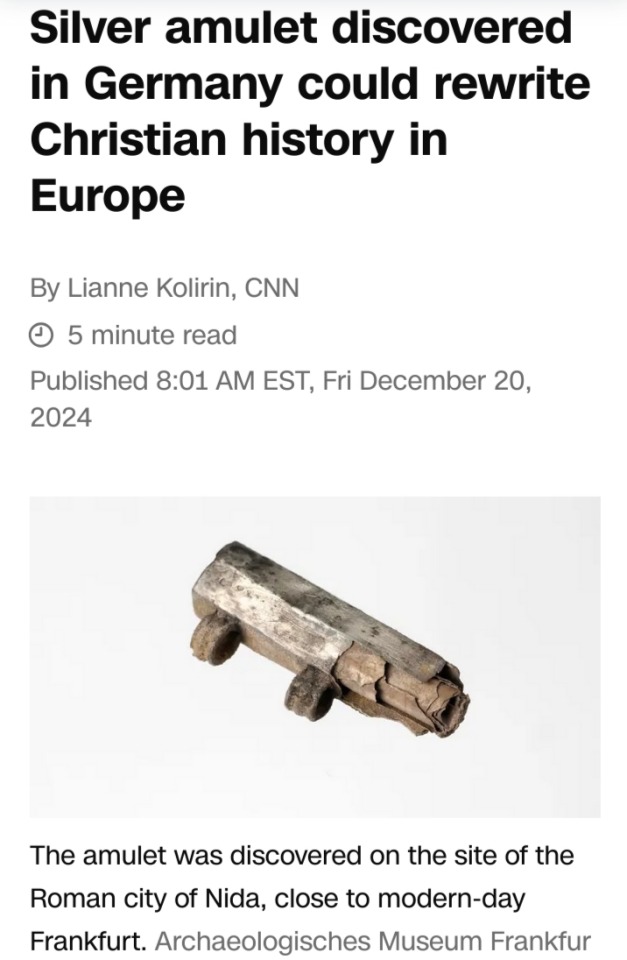
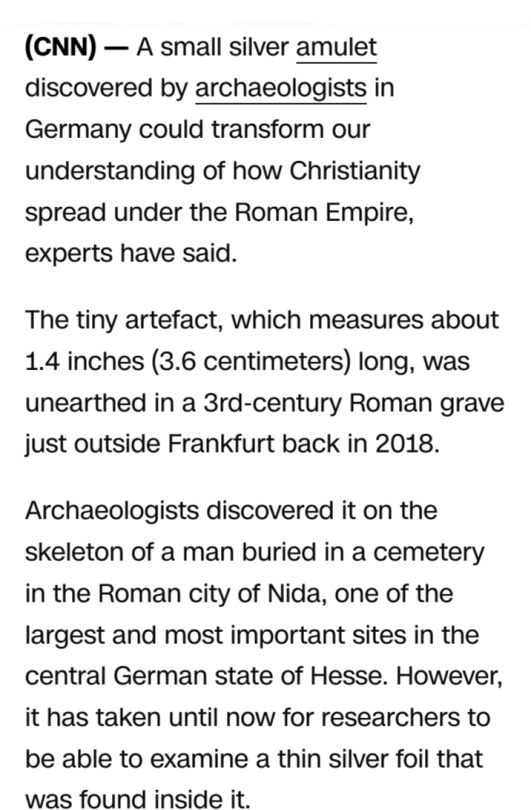
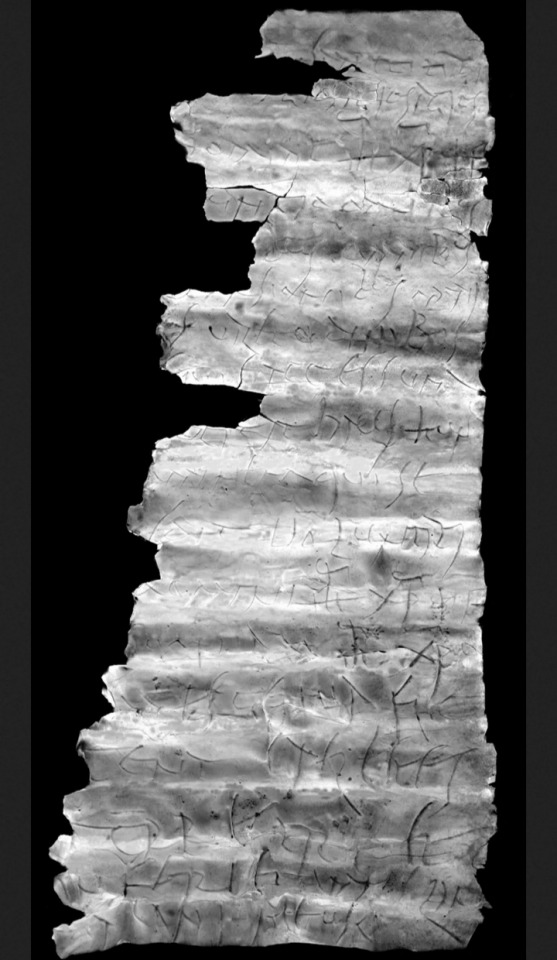



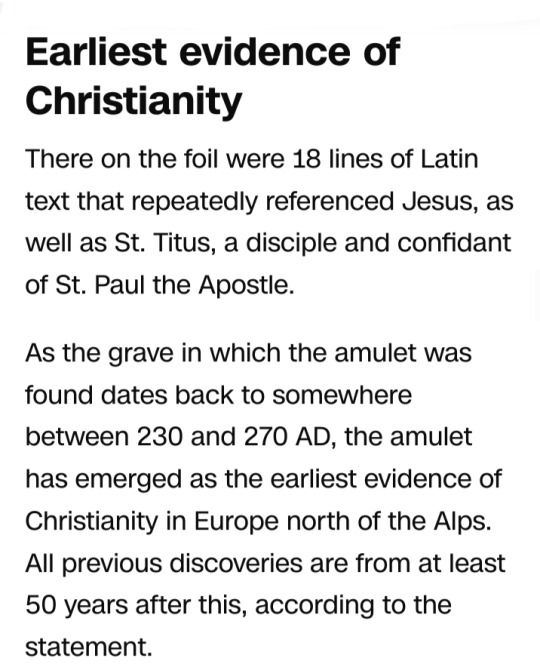
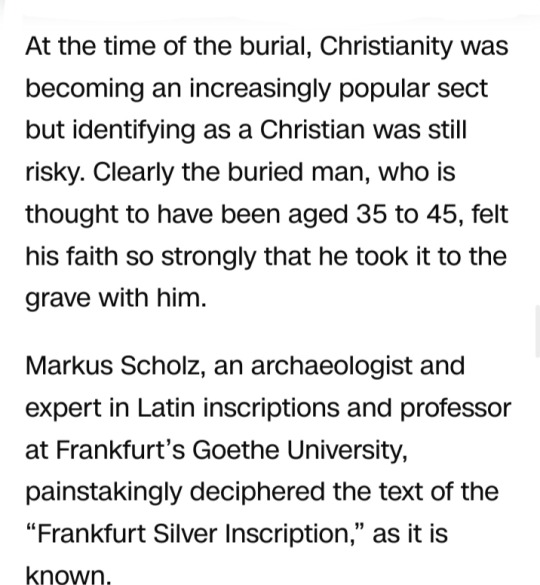
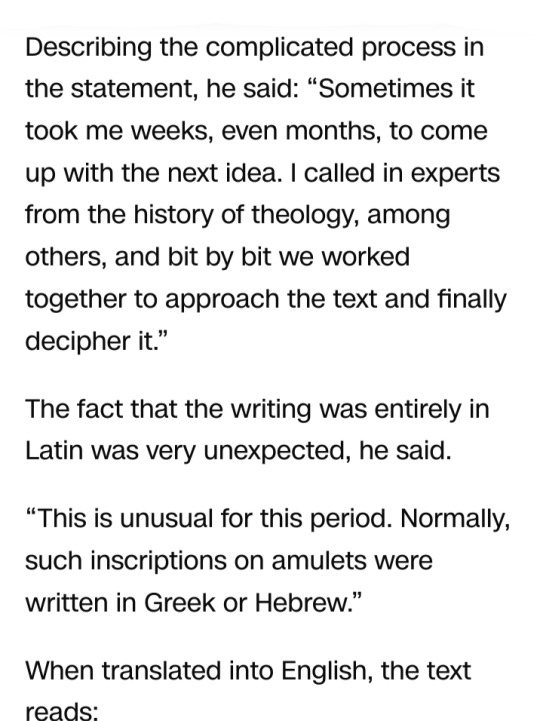
“(In the name?) of St Titus.
Holy, holy, holy!
In the name of Jesus Christ, Son of God!
The Lord of the World
Resists (to the best of his ability?)
All attacks(?)/setbacks(?).
The God(?) grants the well-being
Entry.
This means of salvation(?) protects
The human being who
Surrenders to the will
Of the Lord Jesus Christ, the Son of God,
Since before Jesus Christ
All knees bow to Jesus Christ: the heavenly
The earthly and
The subterranean and every tongue
Confess (to Jesus Christ).”
There is no reference in the text to any other faith besides Christianity, which would also have been unusual at this time.
According to the Frankfurt Archaeology Museum, reliable evidence of Christian life in the northern Alpine regions of the Roman Empire only goes as far back as the 4th century AD.
‘Fantastic find’ made possible by modern technology
Wolfram Kinzig, a church historian and professor from the University of Bonn, helped Scholz to decipher the inscription.
“The silver inscription is one of the oldest pieces of evidence we have for the spread of the New Testament in Roman Germania, because it quotes Philippians 2:10–11 in Latin translation,” Kinzig explained in an interview published on the University of Bonn’s website.
“It’s a striking example of how Biblical quotations were used in magic designed to protect the dead,” said Kinzig.
Peter Heather, a professor of medieval history at King’s College London with a specialist interest in the evolution of Christianity, described the discovery as a “fantastic find.”
Heather, who wasn’t involved in the research, told CNN:
“The capacity to be able to decipher the writing on that rolled-up piece of silver is extraordinary. This is something that’s only possible now with modern technology.
If they’d found it 100 years ago they wouldn’t have known what it was. Silver amulets are probably going to contain some kind of magical scroll but you don’t know what – it could be any religion.”
He added:
“You’ve got evidence of Christian communities in more central parts of the empire but not in a frontier town like that in Roman Germany so that is very unusual, well it’s unique. You’re pushing the history of Christianity in that region back.”
#silver amulet#amulet#germany#nida#frankfurt#archaeology#christianity#christian history#roman empire#artifact#ct scan#phylactery#archaeological museum frankfurt#Leibniz Center for Archaeology in Mainz (LEIZA)#jesus#st. titus#st. paul#frankfurt silver inscription
30 notes
·
View notes
Text

Processional Cross. Gondar, Ethiopia. Solomonid Dynasty. 17th Century CE.
Montreal Museum of Fine Arts.
#ethiopia#Ethiopian#Ethiopian history#art#culture#history#christian history#early modern history#early modern period#montreal museum of fine arts#solomonid
29 notes
·
View notes
Text
2025 marks the 1700th anniversary
of the Nicene Creed.

26 notes
·
View notes
Text
Thinking about how atheist just meant was doing C.hristianity wrong (or improper or p.agan) until Citizen de Sade shook his fist at the C.atholic C.hurch (justifiably considering even the current state of the C.atholic C.hurch) too angrily and it did not formerly mean godless degenerate rhetorically until the 1890s moral panic even though Plato was an atheist before the word atheist existed.

#wip: liaisons x vampires#meerathehistorian#oc: audrey#history#marquis de sade#anti censorship#christian history#anti purity culture#atheist#atheism#french history#european history#history of religion#bisexual#lgbtq+#queer#18th century#anti capitalism#anti communist#character inspiration#agnostic#tankie punks fuck off#tankies#queue are more than what people see#and but if you make atheism your entire personality I am running you through with a sword#religion cw
11 notes
·
View notes
Text

#i can fix them polls#submission poll#my polls#tumblr polls#polls#pontius pilate#pontius#christianity#bible#the bible#Easter#christian holidays#roman history#christian history
13 notes
·
View notes
Text
youtube
I'm a first-year seminary student, and for my final project in Christian History I, I chose to make a presentation for Tumblr! Please check out "Clare in Context", a fifteen-minute crash course in the history of Clare of Assisi.
I still have a reflection to write so watching this helps me with my project! (But, if no one watches it, I guess that's also helpful for the reflection.) If you want to help with the project, please watch it by like 5pm CDT on Friday, 5/23 and let me know what you thought. 🫡
And if you're just interested in Clare, watch it whenever!
#seminary#christian history#st clare of assisi#clare of assisi#medieval history#church history#Youtube
48 notes
·
View notes
Text

Vassago: the honest demonic treasure hunting prince detective!
👑🔎
#history#vassago#demon#usagoo#helluva boss#christian history#ars goetia#prince of hell#lesser key of solomon#demonology#european history#christianity#vivziepop#1600s#helluvaverse#abrahamic religions#helluva boss vassago#mystery#truth#nickys facts
23 notes
·
View notes
Text
Christianity did not steal from paganism.
You know what Christianity did steal from? Judaism.
#religious ramblings#religions#paganism#judaism#history#witchblr#paganblr#christian history#religious history
23 notes
·
View notes
Text

Byzantine Painting of Saint Sergius as a Master of the Knights Templar, Saint Catherine's Monastery, Mount Sinai, Egypt, c.1275 - c.1325.
#byzantine#byzantine history#byzantine art#orthodox#orthodox church#monastery#christianity#christian art#christian history#greek orthodox#greek orthodox church#roman art#romanhistory#roman empire#egypt#sinai
34 notes
·
View notes